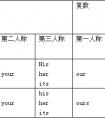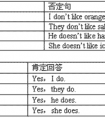用所给动词的 适当形式填空。1. I'm sorry ______ (say) that there's nothing ______ (eat).2. This afternoon the biggest football match of this year ______ (be)-九年级英语
题文
| 用所给动词的 适当形式填空。 |
| 1. I'm sorry ______ (say) that there's nothing ______ (eat). 2. This afternoon the biggest football match of this year ______ (be) on TV. 3. Mr. Wu ______ (see) the film before. 4. It is ten years since I ______ (leave) my hometown. 5. You need something ______ (drink), don't you? 6. Either he or I ______ (be) right. 7. No ______ (smoke) in the hospital, please. 8. He would take out his money and ______ (pay) for the bill. 9. It's time for rest; let's stop ______ (have) our lesson. 10. What color do you decide ______ (buy)? |
答案
| 1. to say; to eat 2. will be 3. has seen 4. left 5. to drink 6. am 7. smoking 8. pay 9. having 10. to buy |
据专家权威分析,试题“用所给动词的 适当形式填空。1. I'm sorry ______ (say) that ..”主要考查你对 不定式,实义动词,动名词,一般过去时,一般将来时 等考点的理解。关于这些考点的“档案”如下:
不定式实义动词动名词一般过去时一般将来时
考点名称:不定式
- 动词不定式:
指由to加上动词原形(而且只能是动词原形)所构成的一种非限定性动词,但在有些情况下to可以省略。
动词不定式在语法功能上可作主语、宾语、宾语补足语、表语、定语和状语。 - 动词不定式可以作以上各种成分,但它毕竟是动词,所以有动词的属性。
动词不定式及其短语还可以有自己的宾语、状语,虽然动词不定式在语法上没有表面上的直接主语,但它表达的意义是动作,这一动作一定由使动者发出。
这一使动者我们称之为逻辑主语,其形式如下:
时态 主动形式 被动形式 一般式 (not) to do (not) to be done 完成式 (not) to have done (not) to have been done 进行式 (not) to be doing 完成进行式 (not) to have been doing - 不定式的用法:
1、不定式作主语
例如:To remember this is very important.
注意:为了避免头重脚轻,在许多情况下,通常都将作主语的不定式置于句子后部,而在句首主语位置使用形式主语it。
例如:It is very important to remember this.
2、不定式作表语
例如:He seems to be ill.
注意:不定式作表语主要有三种情况,一是用于seem, appear, prove等系动词之后的不 定式(尤其是to be),
二是像My job is to sweep the floor. 这样的主语与表语“等价”的情形,
三是表示想法、约定、义务、命令、可能性、命运等,如:
You are to come when I call.
3、不定式作宾语
例如:I can not afford to buy a car.
注意:
①不定式不仅用作动词的宾语,还可用作个别介词(but, except)的宾语。
例如:I had no choice but to wait.
②当作宾语的不定式后跟有宾语补足语时,通常要用形式宾语it代替不定式,并将真正的宾语不定式置于宾语补足语之后
例如:I find it difficult to learn Japanese well.
4、不定式作宾语补足语
例如:Who taught you to drive?
5、不定式作定语
例如:I have a question to ask you.
注意:有的名词(如way, chance, right等)后用作不定式可换成of doing sth.
如:It is the best way to do (of doing) it.
但是以下名词后接不定式作定语时通常不能换成of doing sth.
attempt courage decision effort fortune failure invitation wish
6、不定式作状语
例如:I went to France to learn French.
考点名称:实义动词
- 实意动词:
即行为动词,表示动作的动词。实义动词与系动词是相对的,能独立用作谓语。
它分为及物动词和不及物动词两种:
及物动词是指后面要求有直接宾语的动词;
不及物动词指后面不需要跟宾语的动词。 实意动词使用方法:
及物动词
后面必须跟宾语意义才完整的实义动词,叫做及物动词(transitive verb)。如:
I believe that the committee will consider our suggestion.我相信委员会将会考虑我们的建议。
“How long can I keep the book ?”Harry asked.哈里问:“这本书我可以借多久?”
Dr. Bethune set us a good example. 白求恩大夫给我们树立了好榜样。
Crude oil contains many useful substances.原油含有许多有用的物质。
不及物动词
本身意义完整后面不须跟宾语的实义动词,叫做不及物动词(intransitive verb)。如:
Birds fly.鸟会飞。
It happened in June 1932.这件事发生于一九三二年六月。
My watch stopped.我的表停了。
She spoke at the meeting yesterday evening. 她在昨天晚上的会上发了言。
兼作及物动词和不及物动词
英语里有不少实义动词可以兼作及物动词和不及物动词。这样的动词又有两种不同的情况
a)兼作及物动词和不及物动词时,意义不变。试比较:
Shall I begin at once?我可以立刻开始吗?(begin作不及物动词)
She began working as a librarian after she left school.她毕业后当图书馆管理员。(began作及物动词)
When did they leave Chicago?他们是什么时候离开芝加哥的?(leave 作及物动词)
They left last week. 他们是上周离开的。(left 作不及物动词)
b)兼作及物动词和不及物动词时,有时意义不尽相同。如:
Wash your hands before meals.饭前要洗手。
Does this cloth wash well? 这布经得起洗吗?- 英汉实意动词用法比较:
与汉语的比较,有时英语动词的及物和不及物的用法,与汉语的用法不一样,请注意下列两种情况:
a)有的动词在英语里只能用作不及物动词,而汉语则可用作及物动词,如arrive到达,agree同意,listen听。英语里这些动词后面常接介词。如:
We arrived at the railway station at noon.
我们于中午到达火车站。(at不能省去)
(比较:We reached the railway station at noon.)
Everybody listened to the lecture with great interest.
每个人都很有兴趣地听讲课。(to不可省去)
(比较:We all heard the lecture.)
Do they agree to the plan?他们同意这个计划吗?(to不可省去)
b)有的动词在英语里能用作及物动词,而在汉语里则不能用作及物动词,如serve为…服务。
Our children are taught to serve the people wholeheartedly.
我们的儿童被教以全心全意为人民服务
用于be动词之后,实义动词之前。 实意动词的用法:
肯定句:
主语+动词过去式+其它
- 最新内容
- 相关内容
- 网友推荐
- 图文推荐
| [家长教育] 孩子为什么会和父母感情疏离? (2019-07-14) |
| [教师分享] 给远方姐姐的一封信 (2018-11-07) |
| [教师分享] 伸缩门 (2018-11-07) |
| [教师分享] 回家乡 (2018-11-07) |
| [教师分享] 是风味也是人间 (2018-11-07) |
| [教师分享] 一句格言的启示 (2018-11-07) |
| [教师分享] 无规矩不成方圆 (2018-11-07) |
| [教师分享] 第十届全国教育名家论坛有感(二) (2018-11-07) |
| [教师分享] 贪玩的小狗 (2018-11-07) |
| [教师分享] 未命名文章 (2018-11-07) |


![Sunday is my birthday. I would like _____ a birthday party, would you _____to my party? [ ]A. have; come B. to have; to come C. have; to come D. to have-七年级英语](http://www.00-edu.com/d/file/ks/4/2/budingshi/2020-01-08/smalla85122db0c71d7fb6ae58187be7f1fd11578430330.png)

![Why areyou here? You are supposed ______ in the classroom now. [ ] A. to studyB. to be studiedC. studying D. to be studying -九年级英语](http://www.00-edu.com/d/file/ks/4/2/budingshi/2020-01-08/small6dee02daa62cac1c71853ac804ab4fbd1578422460.png)
![She is very poor. Little food _____ and no room _____! [ ]A. to eat, to live B. to eat, to live in C. eating, living -八年级英语](http://www.00-edu.com/d/file/ks/4/2/budingshi/2020-01-09/small17b77c2697a3ef8f1461d0d14b016ee51578585185.png)


